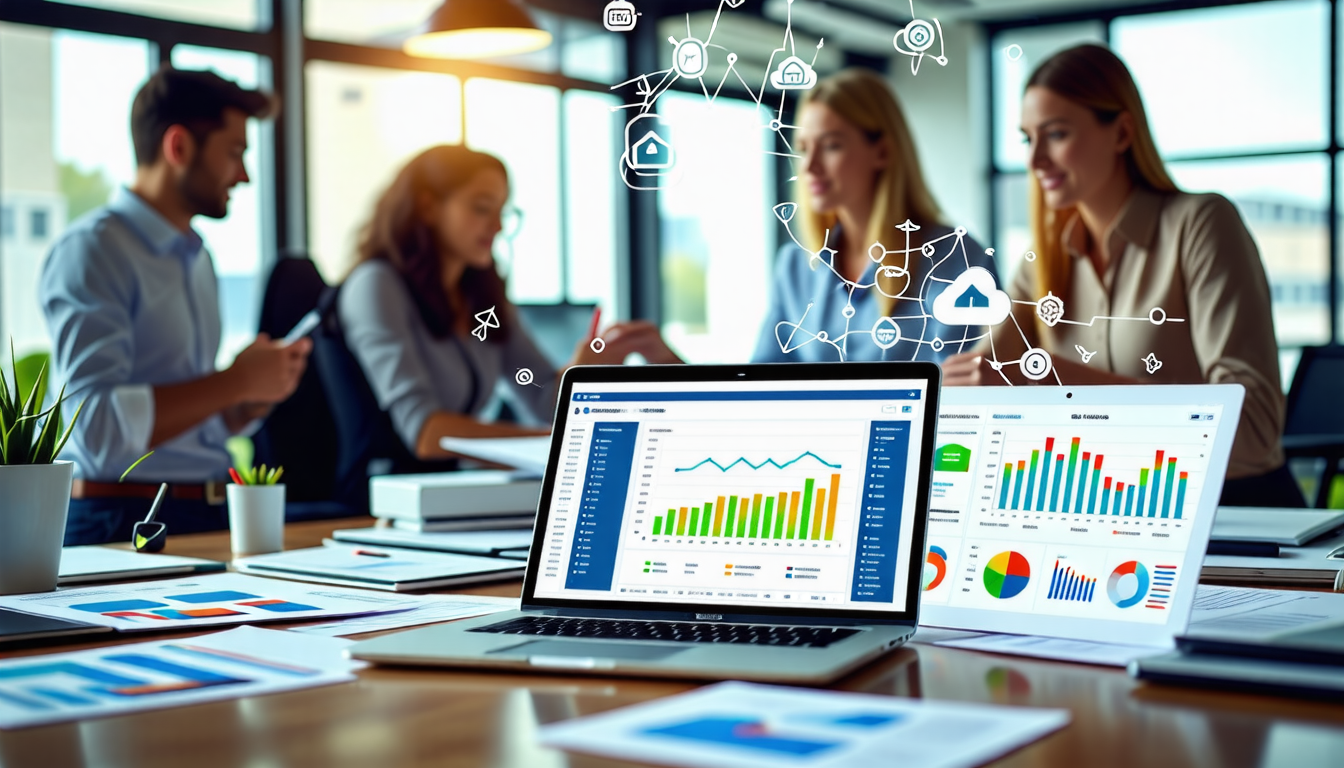|
IN BRIEF
|
In today’s rapidly evolving business landscape, SaaS accounting software has emerged as an essential tool for companies striving for efficiency and growth. This innovative technology offers real-time financial insights, enabling businesses to make informed decisions and maintain a competitive edge. With its scalable nature, automation capabilities, and accessibility from any location, SaaS accounting solutions are helping organizations streamline their financial processes and enhance productivity. As more companies embrace digital transformation, the benefits of these software solutions are becoming increasingly evident, driving better financial management and operational success.

In today’s fast-paced business environment, SaaS accounting software stands out as a transformative tool for organizations seeking to enhance their financial processes. These cloud-based solutions provide businesses with real-time insights, scalability, and automated features that are essential for efficient financial management. Here, we delve into the myriad benefits these platforms offer to modern enterprises.
Table of Contents
ToggleReal-Time Financial Insights
One of the most significant advantages of SaaS accounting software is the provision of real-time financial insights. This capability empowers businesses to make informed decisions promptly, based on the latest data. With access to real-time reporting, companies can monitor key performance indicators, track expenses, and analyze revenue trends without delay, leading to better strategic planning and operational efficiency.
Scalability to Accommodate Growth
SaaS accounting solutions are designed with scalability in mind, enabling businesses to adapt the software as they grow. Whether a company expands its operations, adds new products, or increases its customer base, SaaS platforms can seamlessly adjust to these changes without the need for extensive reconfiguration. This flexibility ensures that businesses can continue to operate efficiently as their needs evolve.
Increased Efficiency Through Automation
By automating tedious accounting tasks, SaaS accounting software allows finance teams to focus on more strategic work. Routine functions such as journal entries, invoice generation, and financial statement updates can be handled automatically, significantly reducing the time spent on manual data entry. This not only enhances accuracy but also frees up valuable time for employees to concentrate on higher-level financial analysis and decision-making.
Improved Accuracy and Security
Another critical benefit of SaaS accounting software is the improvement in accuracy facilitated by automated calculations and standardized processes. Automated systems minimize the risk of human error, ensuring that financial reports are precise and reliable. Furthermore, many SaaS solutions incorporate robust security measures, safeguarding sensitive financial information through encryption and regular backups, which is vital for maintaining compliance and protecting a business’s reputation.
Cost-Effectiveness
Implementing SaaS accounting software can significantly reduce operational costs. By eliminating the need for extensive hardware and IT support, businesses can invest those resources elsewhere. Additionally, the subscription-based model of SaaS platforms allows companies to manage their budgets more effectively, avoiding large upfront costs associated with traditional accounting systems. Over time, these savings contribute to a more sustainable financial strategy.
Accessibility and Collaboration
With SaaS accounting solutions, accessibility is no longer a limitation. Users can access the software from any device with internet connectivity, facilitating collaboration among remote teams or multi-location businesses. This heightened accessibility ensures that key stakeholders can stay informed and contribute to financial discussions regardless of their geographical location, enhancing overall collaboration and decision-making.
Integration with Other Business Tools
Many SaaS accounting tools offer seamless integration with other software applications, allowing businesses to streamline their financial operations further. This integration can encompass everything from customer relationship management (CRM) systems to e-commerce platforms, ensuring that all parts of the business work cohesively. Such interoperability reduces the need for manual data transfers, enhances data accuracy, and improves overall operational workflows.
Ultimately, adopting SaaS accounting software significantly improves the way modern businesses manage their finances. By harnessing real-time insights, scalability, and automation, these companies can not only enhance operational efficiency but also pave the way for sustained growth in an increasingly competitive landscape. Explore various SaaS accounting software solutions tailored for your business needs.
Comparative Benefits of SaaS Accounting Software
| Benefit | Description |
| Real-Time Financial Insights | Access up-to-date financial data for informed decision-making. |
| Scalability | Easily adjust software capabilities to match business growth. |
| Automation | Streamline repetitive tasks, freeing up time for strategy. |
| Cost-Effectiveness | Lower operational costs through reduced manual intervention. |
| Accessibility | Access software from any device with an internet connection. |
| Enhanced Accuracy | Minimize errors in financial reporting through automated processes. |
| Improved Collaboration | Facilitate teamwork with shared access to financial data. |
| Compliance Support | Stay updated with regulations through automated compliance features. |
| Customization | Tailor features to meet the specific needs of your business. |
In the rapidly evolving landscape of modern business, SaaS accounting software has emerged as a vital tool that helps organizations manage their financial operations more efficiently and effectively. By offering real-time insights, scalability, and automation, this software enables companies to focus on strategic decision-making rather than being bogged down by manual tasks. Below, we explore the numerous benefits that SaaS accounting solutions bring to contemporary enterprises.
Real-Time Financial Insights
One of the defining features of SaaS accounting software is its ability to deliver real-time financial insights. This capability ensures that businesses are equipped with up-to-date information concerning their financial health, allowing them to make informed decisions promptly. Whether managing cash flow, tracking expenses, or analyzing profit margins, having immediate access to this data is crucial for growing businesses.
Enhanced Efficiency and Productivity
Automation is at the heart of SaaS accounting software, drastically reducing the time spent on manual tasks such as creating journal entries and generating financial statements. With these tedious responsibilities streamlined, teams can redirect their efforts toward more strategic activities, thereby enhancing overall productivity. As outlined in various resources, the efficiency gains from implementing SaaS accounting solutions can lead to substantial time and cost savings.
Scalability and Flexibility
Modern businesses are often characterized by their dynamic nature, with growth and change being constant factors. SaaS accounting software offers unparalleled scalability, allowing companies to easily adjust their software usage as they expand. This means that businesses can add functionalities, streamline invoicing processes, or integrate new tools without the need for extensive hardware upgrades. Access to reliable billing solutions further enhances this flexibility, making it easier to adapt to evolving market demands.
Accessibility from Any Location
Another significant advantage of SaaS accounting software is its cloud-based nature, providing access to financial data from anywhere with an internet connection. This makes it especially beneficial for businesses operating in a remote or hybrid work environment. As employees can log in securely, they can collaborate on financial matters without being tied to a specific location. This level of accessibility fosters greater teamwork and facilitates swift decision-making.
Cost-Effectiveness
Investing in SaaS accounting solutions can lead to substantial long-term cost reductions. By automating routine financial processes, businesses save not only on labor costs but also on errors that can result from manual data entry. Additionally, with the elimination of IT responsibilities related to software maintenance and updates, companies gain further financial relief. The cost savings realized by utilizing SaaS accounting software can be reinvested into other business areas, driving growth.
Data Security and Compliance
In an era marked by increasing concerns about data breaches, SaaS accounting software often includes robust security features that protect sensitive financial information. Many providers offer advanced encryption, routine backups, and compliance with regulatory standards, ensuring that businesses can operate with confidence. By utilizing SaaS solutions, organizations not only safeguard their operations but also build trust with their stakeholders.
As businesses continue to embrace digital transformation, the role of SaaS accounting software becomes ever more critical. It is not just a tool; it is a catalyst for enhancing operational efficiency and driving strategic growth in the modern business landscape. For a deeper exploration of this topic and potential tools that could benefit your organization, consider visiting resources like Koombea and Accounting Prose.
- Real-Time Financial Insights: Access and analyze financial data instantly for informed decision-making.
- Scalability: Easily expand your financial tools as your business grows without significant investments.
- Automation: Streamline repetitive tasks, allowing teams to focus on strategic initiatives.
- Cost Savings: Reduce operational costs by minimizing manual errors and administrative workload.
- Improved Accuracy: Generate precise financial statements, enhancing compliance and reporting.
- Accessibility: Work from anywhere securely with cloud-based solutions.
- Increased Productivity: Optimize workflows and eliminate bottlenecks in financial operations.
- Streamlined Invoicing: Automate billing processes for faster payments and improved cash flow.
- Enhanced Collaboration: Facilitate team cooperation through centralized data access and sharing.
- Integration Capabilities: Easily connect with other business tools, enhancing overall efficiency.
The Transformative Power of SaaS Accounting Software
SaaS accounting software stands out as a revolutionary solution for modern businesses. By leveraging the capabilities of cloud technology, companies can gain real-time financial insights, streamline their operations, and enhance efficiency with automated processes. This guide explores the numerous benefits that SaaS accounting software brings to the table, making it an indispensable tool for growth and strategic decision-making.
Real-Time Financial Insights
Access to real-time financial insights is crucial for businesses navigating today’s competitive landscape. SaaS accounting software enables companies to instantly access their financial data, allowing for informed decision-making. Firms can monitor their cash flow, track expenses, and analyze performance metrics without delays. This immediate visibility into financial status empowers business leaders to make adjustments proactively and seize opportunities as they arise.
Scalability to Support Growth
One of the most compelling advantages of SaaS accounting software is its inherent scalability. Modern businesses, especially those experiencing growth, require solutions that can adapt to their evolving needs. SaaS platforms can effortlessly accommodate an increasing volume of transactions and users without necessitating major overhauls or costly upgrades. This flexibility ensures that companies can continue to thrive without being constrained by their accounting systems.
Cost-Effectiveness
Implementing SaaS accounting software can lead to significant cost savings. By automating routine tasks such as data entry, generating reports, and managing invoices, businesses can reduce labor costs and minimize errors. Additionally, traditional accounting systems often come with hefty upfront costs and ongoing maintenance fees. SaaS solutions typically operate on a subscription basis, transforming high capital expenditures into manageable operational expenditures.
Enhanced Productivity through Automation
The automation capabilities of SaaS accounting solutions are transformative for operational efficiency. By taking over tedious tasks, such as creating journal entries and generating financial statements, these platforms free up valuable time for finance teams to focus on strategic tasks. This shift not only boosts productivity but also enhances the overall quality of financial reporting, allowing businesses to allocate their resources more effectively.
Accessibility and Collaboration
In today’s fast-paced work environment, the ability to access financial information from anywhere is vital. SaaS accounting software offers cloud-based access, allowing stakeholders to collaborate in real time, without geographical constraints. This connectivity fosters better communication among team members and external partners, such as accountants or auditors, promoting seamless collaboration and ensuring everyone has access to the most up-to-date financial data.
Improved Compliance and Security
Staying compliant with ever-changing regulations can be a daunting task for businesses. SaaS accounting solutions often come equipped with built-in compliance features, reducing the burden on finance teams. Additionally, these platforms prioritize data security through encryption, regular backups, and security protocols. This enhances the protection of sensitive financial data, reassuring businesses that their information is safeguarded against potential threats.
The integration of SaaS accounting software is rapidly becoming a necessity for modern businesses looking to drive efficiency and growth. With an array of benefits including real-time insights, scalability, increased productivity, accessible collaboration, and enhanced security, companies can position themselves favorably in an ever-evolving market. Embracing these cloud-based solutions is not just a trend; it’s a strategic move towards achieving operational excellence in today’s digital age.
Frequently Asked Questions about SaaS Accounting Software Benefits
What are the main benefits of SaaS accounting software for modern businesses? SaaS accounting software provides real-time financial insights, scalability, and automation, enabling businesses to manage their finances more efficiently.
How does SaaS accounting software enhance productivity? By automating tedious tasks such as journal entries and financial statement generation, SaaS accounting software allows teams to focus on strategic planning and decision-making.
Is SaaS accounting software scalable? Yes, the inherent scalability of SaaS accounting solutions means they can grow alongside your business, accommodating increasing financial complexities and data volumes.
Can SaaS accounting software be accessed from anywhere? Absolutely, SaaS accounting software can be accessed from any location with internet connectivity, making it ideal for businesses with remote teams.
What key features should businesses look for in SaaS accounting software? Businesses should prioritize features such as real-time financial reporting, automation capabilities, and user-friendly interfaces when evaluating SaaS accounting solutions.
How does implementing SaaS accounting software impact financial accuracy? SaaS accounting software ensures accurate, timely, and relevant financial statements, reducing the risk of manual errors that can occur with traditional accounting methods.
Are there any downsides to adopting SaaS accounting software? While there are numerous advantages, businesses should be aware of potential challenges such as data security concerns and reliance on internet connectivity.
What role does automation play in SaaS accounting? Automation in SaaS accounting eliminates manual processes, saving time and allowing for more strategic financial management and analysis.
How does SaaS accounting software contribute to cost savings? By reducing the need for manual labor and optimizing financial processes, companies can achieve significant long-term savings with SaaS accounting solutions.
What types of businesses can benefit from SaaS accounting software? Modern businesses of all sizes and industries can benefit from SaaS accounting software, particularly those looking to improve financial efficiency and streamline operations.


